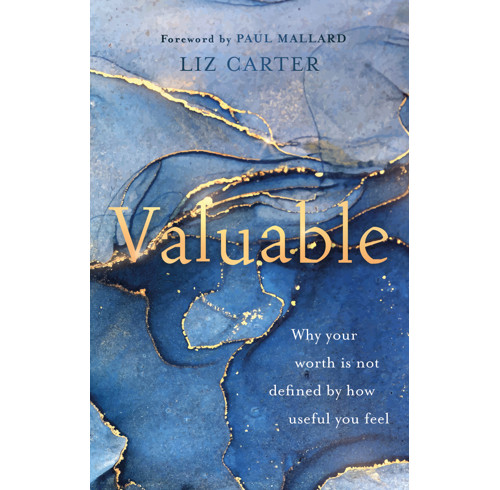
Come and see that our purpose as Christians is not about being useful but about being known by God and enjoying him.
We all want to be useful to God, but often we feel that we're not, or, because of illness or other difficulties, that we can't be as active as we'd like to be. Liz Carter wants to rescue us from the spiral of feeling useless that we get caught in, and to show us that being useful isn't what Christianity is about. In fact, the Bible barely talks about God using people at all.
Weaving together insightful scriptural analysis and beautifully told stories, Liz takes us on a journey to see what the Bible really says about weakness, identity and God's purposes for us: helping us to see ourselves and our relationship with God in an entirely different and much more glorious way. Readers will discover that our purpose as Christians is not about being useful but about being known by God and enjoying him.
This book is particularly helpful for those struggling with long-term physical or mental illness, but it's also a great encouragement to Christians who feel that they are not good enough or useful enough to God for other reasons.
Questions at the end of each chapter make this a helpful resource to read with a friend or in groups.
Introduction
1. We Are the Useless
2. Into the Upside-Down
3. God Is Not a User
4. A Church for Broken People
5. A New Kind of Wholeness
6. A New Hope Story
7. Into an Upside-Down Identity
8. Liberated into Utmost You
Scripture Reflections
| Contributors | Liz Carter, Paul Mallard |
|---|---|
| ISBN | 9781784988890 |
| Format | eBook |
| First published | June 2023 |
| Language | English |
| Publisher | The Good Book Company |

Having benefitted hugely from Liz’s writing previously, I eagerly anticipated this latest book. She writes authentically, beautifully and with great depth—as well as a thorough knowledge of Scripture. I commend this book to you—let its rich treasures of hope, truth and freedom reach deep into your soul.

Liz Carter beautifully challenges our values and language, which in turn challenges our culture. We all have a choice around what culture we want to build in churches, families and communities. This book, with its personal stories and theological reflections, is a gem and will be so helpful for everyone. I thoroughly recommend it.

A brave and important book. Liz Carter invites us to explore fresh ways to approach brokenness, and to see that God’s love comes through receiving, not through what we do. With its powerful and eloquent illustrations, Valuable is both beautiful and helpful.
There seem to me, two influencing themes in this book, being "Valuable" and dealing with life's disappointments. They both have merit, and depending on the readers experience of these themes, the book either meets that need or doesn' quite match. However, it does depend on where the reader "is" at the time of reading. The book deserves further re-reading and study to glean nuggets from the writers experiences.
I think the undertone of her feeling useless because of her own struggles came through heavily in her hammering the idea of never using the word use. The title of the book is “Valuable” and she could’ve focused on our value being in Christ alone, but didn’t do that as much as I thought she ought to. There were snippets throughout the book, but that should’ve been the focus. The truth is that we all have struggles. We are imperfect sinners who attempt to fill voids or overcome struggles by finding our identity and value in various things instead of focusing on our identity being in Christ alone and our value coming solely from Him. We are valuable because He says we are - despite our circumstances, limitations, and weaknesses. We are strong through Him. We needn’t worry what the world says or thinks about us because we are chosen, dearly loved, adopted children of God. We should fix our eyes on Jesus rather than our weaknesses. We That should have been the focus of this book. That should’ve been oozing from every page. And it wasn’t. And it was a great misstep because more people need to hear the good news of the gospel. God redeems us. He redeems our situations, our struggles, our sin.
Pages 96-98 were some of the only that I was wholeheartedly agreeing with. Here she wrote about our hope in Jesus because of his life, death, and resurrection and viewing pain through the lens of that future hope, standing firm in Christ, producing Godly endurance, and giving glory to Him. I would have loved to see the entire book focus around these few pages. It would have made a world of difference. I appreciated the author’s desire to bring this topic to light, but I for me, this book missed the mark.
This book contains much treasure and Godly wisdom needed for this dark modern age we live in.
It is food for the soul and a balm for the anxious mind.
All my life I have lived the ‘useful’ lie – for this, read – good enough, done enough, could have, should have - but didn’t, not as good as …… comparing myself and my family to those ‘shiny, happy’ people Liz speaks of and believing the lie that as a Christian especially, I should be better, more together, and whole than I have been. Lies I have told myself. Lies the world, particularly social media, tells us. But, no more.
Read this book and discover the freedom of life lived in the expanses of God’s redeeming, transforming, outrageous grace, where we are accepted as we are, loved unconditionally and can know joy and peace in the middle of the mess and a broken world.
In Valuable, Liz Carter discusses the problematic language of “usefulness” to God and helps us to explore better ways to convey what we actually mean with that statement.
Why is this a huge deal? Because usefulness often infers the necessity of ability and Liz asks us to think of those who may be less able-bodied or able-minded than others.
Liz also speaks about how much of a challenge this language can be for a new believer that came from an abusive background where being “used” wasn’t something worth celebrating. Think of the confusion it could cause when they hear “God wants to use you.”
I’ll be honest—initially, I thought that it was just semantics, but as I continued reading, Liz helped me to understand why it’s bigger than that. She helped me to see how being “used” speaks more to performance and productivity rather than posture and position. It’s much more works-based than identity-based.
I appreciate Liz’s heart for the subject matter, especially given her own battle with chronic illness. I was an easy read that opened my eyes to a new perspective.
I received a copy of this book for free from The Good Book Company in exchange for this honest review.
It can be really easy to slip into the mindset that we're not really that great... that we're not as useful as others, as clever as others, or just not as good. And yet, God sees us as valuable, as precious, and pours his love out upon us. In this short book, Liz Carter uses scripture and stories to show us that every person is valuable and matters to God, and gives us hope for how we can each grow into a deeper relationship with him.
Valuable by Liz Carter was such an insightful read. This book challenges you to consider the language used by the Church when thinking about value. Carter mentions that she has a chronic illness and that while it may be well meaning when people talk about her ability to still be used by God it can be detrimental instead of uplifting as the person speaking may mean. She is able to share a wealth of examples on this topic and turn to the Bible to lay a Biblical foundation for our identity in Christ and our relationship with God.
This was an easy read and at the end of each chapter there is a prayer and a section with prompts for reflection allowing the reader to dive into the chapter further. Then at the end of the book there is a 7 day reflection guide. I think these reflection sections were helpful and would recommend spending time going through them.
This book is perfect to go through on your own but also would be a great option to go through with a small group.
Valuable by Liz Carter was such an insightful read. This book challenges you to consider the language used by the Church when thinking about value. Carter mentions that she has a chronic illness and that while it may be well meaning when people talk about her ability to still be used by God it can be detrimental instead of uplifting as the person speaking may mean. She is able to share a wealth of examples on this topic and turn to the Bible to lay a Biblical foundation for our identity in Christ and our relationship with God.
This was an easy read and at the end of each chapter there is a prayer and a section with prompts for reflection allowing the reader to dive into the chapter further. Then at the end of the book there is a 7 day reflection guide. I think these reflection sections were helpful and would recommend spending time going through them.
This book is perfect to go through on your own but also would be a great option to go through with a small group.
his lyrical, friendly book unpicks a great big knot of language and misunderstanding at the heart of the Christian approach to disability and suffering. By replacing the language of use with the language of value - and carefully showing through scripture why this makes sense - Liz Carter reminds all of us how much we are loved and valued by God, while at the same time offering immeasurable comfort to those who have been bruised by well-meaning but shallow and inaccurate theology.
Carter lets no challenge go unfaced, sorting through the difference between being useful and being valued; being used and offering to serve; usefulness and dying to self. This book points to a robust theology of suffering and service.
In this book, Liz Carter dismantles harmful or unhelpful ways that people talk about Christian faithfulness and ministry, showing how wrong it is for Christians to relate to God based on metrics of use instead of approaching God as a Father who delights in His children.
Carter writes about this from her perspective as someone who suffers from chronic illness, sharing anecdotes from her life and presenting hypothetical scenarios of ways people can feel marginalized when churches prize external measures of success. She also makes important points about how someone doesn't have to turn their worst traumas into a ministry to show that their suffering has meaning. Carter differentiates true callings from guilty feelings of obligation, and shares passages from Scripture to back up her points about how God relates to people and works in their lives.
Carter also criticizes terminology related to God "using" people, saying that even though people usually mean this in a positive way, the language of "use" can imply control and exploitation, especially for people with abuse histories. She encourages people to use language that implies a partnership, in which God works with us to accomplish good in the world, rather than "using" us like a tool that you can use up and discard. I thought that was very insightful.
This is an excellent book for suffering Christians who feel guilty for not doing enough. It is also an important read for ministry leaders, both as rest for their souls and a careful warning against messages and attitudes they may communicate that may harm vulnerable people. This book is a compelling, short read with a unique message, and I am sure that it will make a lasting impression on many readers.
Note: I received a free copy from the publisher in exchange for an honest review.
Reading this book feels like coming home, not to a place where shame and negative beliefs knock at the door but to a place where we can rest and just be, knowing we are unconditionally loved by God for who we are and not for what we do.
Through her own journey of living with chronic illness and by deftly weaving others vulnerable stories throughout the book, Liz leads us out of the mire of feeling weak and useless, showing us through scripture that our value is in God and not in how useful we are. She teaches us that His greatest desire is for intimacy with us.
Liz lives out what she is offering us here and is honest and authentic in vulnerably sharing her own struggles with feeling useful. This book is so needed and will deeply impact many people’s lives and that’s not something I say lightly!
With reflection questions at the end of each chapter and a study guide at the end of the book this is a great resource for both the individual or a group.